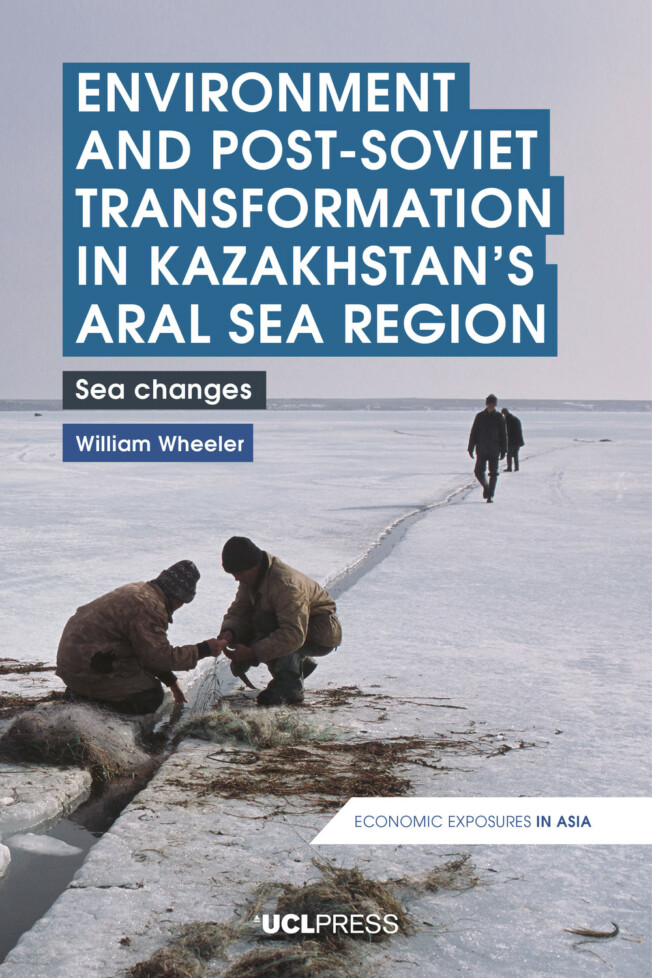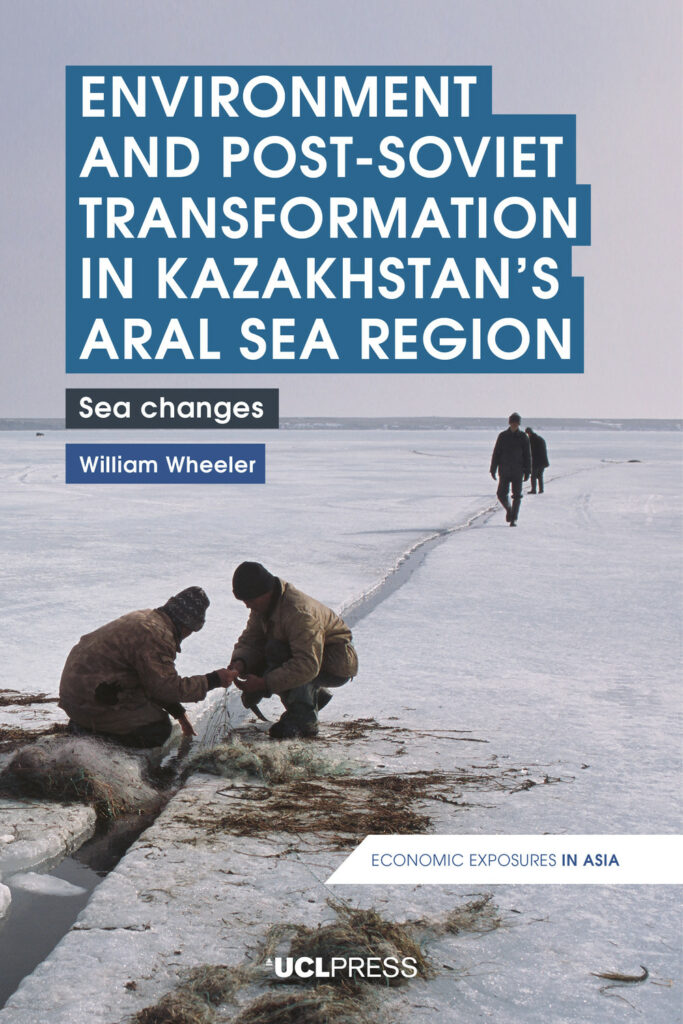
Environment and Post-Soviet Transformation in Kazakhstan’s Aral Sea Region
Sea changes
William Wheeler (Author)
Series: Economic Exposures in Asia
The Aral Sea is well known for its devastating regression over the second half of the twentieth century, and for its recent partial restoration. Environment and Post-Soviet Transformation in Kazakhstan’s Aral Sea Region is the first book to explore what these monumental changes have meant to those living on the sea’s shores.
Following the fluctuating fortunes of the pre-Soviet, Soviet and post-Soviet fisheries, the book shows how the vast environmental changes the region has undergone cannot be disentangled from the transformations of Soviet socialism and postsocialism. This ethnographic perspective prompts a critical rethinking of the category of environmental disaster through which the region is predominantly known. Tracing how the sea’s retreat and partial return have been apprehended by diverse local actors in the former port of Aral’sk and surrounding fishing villages, as well as by scientists, bureaucrats and international development workers, William Wheeler draws out the multiple meanings environmental change acquires within different contexts. This study of how people make their lives amidst overlapping ecological and political-economic upheavals is rich in ethnographic detail that is both rooted in Soviet legacies and alive to the new transnational connections that are reshaping the region.
Offering a rigorous political ecology of Soviet socialism and after, the book is a major contribution to the nascent environmental anthropology of Central Asia. It will be of interest to environmental anthropologists, environmental historians, and scholars of all disciplines working on Central Asia and the former USSR.
Praise for Environment and Post-Soviet Transformation in Kazakhstan’s Aral Sea Region
‘A welcome addition to the existing literature on Central Asia, post-socialism, and the anthropology of the environment.’
Journal of Anthropological Research
‘A godsend…one of the most recent, must-read, and up-to-date analyses of this disaster and its effects… rich with the author’s personal experience and encounters with the local people as he takes on an ethnographic journey.’
Erdkunde
‘A nuanced, sensitive portrait of local lives based upon extensive fieldwork and research in two languages, Russian and Kazakh…a wonderful contribution to the field of environmental studies and scholarship on Central Asia. As an added bonus, the book has been published in an open access format and can be downloaded for free on the publisher’s website.’
Environment and History
‘A rich ethnographic account of people’s life amidst environmental and political-economic changes.’
Water Alternatives
‘Based on extensive ethnographic fieldwork in Kazakhstan, Wheeler illuminates the complex situation on the ground in Aral΄sk, Kazakhstan.’
Slavic Review
‘Wheeler’s work is an important statement about Soviet nature.’
Laboratorium: Russian Review of Social Research
‘…makes an important contribution to the environmental anthropology literature by taking the idea of entanglements from a materiality-focused perspective and bringing it back into human dimensions through the concept of ‘discursive entanglements’’
Journal of the Royal Anthropological Institute (JRAI)
List of figures
List of maps
Acknowledgements
Note on transliteration
Glossary and abbreviations
Maps
Introduction
1 The Aral Sea and the modernisation of Central Asia: a century of catastrophes
2 Seeing like a bureaucrat: problems of living standards and employment
3 Ocean fish, state socialism and nostalgia in Aral’sk
4 Continuity and rupture in Aral fishing villages
5 From Soviet ruins: flounder, the Kökaral dam, and the return of the Small Aral Sea
6 Zander and social change in Bögen
7 Aral’sk today: fish, money, ekologiia
Conclusion
Appendix
Bibliography
Index
DOI: 10.14324/111.9781800080331
Number of illustrations: 64
Publication date: 25 October 2021
PDF ISBN: 9781800080331
EPUB ISBN: 9781800080362
Hardback ISBN: 9781800080355
Paperback ISBN: 9781800080348
William Wheeler (Author) 
William Wheeler is Leverhulme Early Career Fellow in Social Anthropology, University of Manchester. He carried out fieldwork in the Aral Sea region of Kazakhstan in 2012-14, completing his PhD at Goldsmiths, University of London, in 2016. His current research project is closer to home, looking at experiences of enforced destitution and encounters with a hostile, disbelieving bureaucracy among those seeking asylum in UK.
‘a godsend…one of the most recent, must-read, and up-to-date analyses of this disaster and its effects… rich with the author’s personal experience and encounters with the local people as he takes on an ethnographic journey…’
Erdkunde
‘a welcome addition to the existing literature on Central Asia, post-socialism, and the anthropology of the environment’
Journal of Anthropological Research
‘a nuanced, sensitive portrait of local lives based upon extensive fieldwork and research in two languages, Russian and Kazakh…a wonderful contribution to the field of environmental studies and scholarship on Central Asia. As an added bonus, the book has been published in an open access format and can be downloaded for free on the publisher’s website.’ Environment and History
‘a rich ethnographic account of people’s life amidst environmental and political-economic changes’
Water Alternatives
‘Based on extensive ethnographic fieldwork in Kazakhstan, Wheeler illuminates the complex situation on the ground in Aral΄sk, Kazakhstan.’
Slavic Review
‘Wheeler’s work is an important statement about Soviet nature.’
Laboratorium: Russian Review of Social Research
‘Makes an important contribution to the environmental anthropology literature by taking the idea of entanglements from a materiality-focused perspective and bringing it back into human dimensions through the concept of ‘discursive entanglements’’
Journal of the Royal Anthropological Institute (JRAI)
Related titles
Environment and Post-Soviet Transformation in Kazakhstan’s Aral Sea Region
Sea changes
The Aral Sea is well known for its devastating regression over the second half of the twentieth century, and for its recent partial restoration. Environment and Post-Soviet Transformation in Kazakhstan’s Aral Sea Region is the first book to explore what these monumental changes have meant to those living on the sea’s shores.
Following the fluctuating fortunes of the pre-Soviet, Soviet and post-Soviet fisheries, the book shows how the vast environmental changes the region has undergone cannot be disentangled from the transformations of Soviet socialism and postsocialism. This ethnographic perspective prompts a critical rethinking of the category of environmental disaster through which the region is predominantly known. Tracing how the sea’s retreat and partial return have been apprehended by diverse local actors in the former port of Aral’sk and surrounding fishing villages, as well as by scientists, bureaucrats and international development workers, William Wheeler draws out the multiple meanings environmental change acquires within different contexts. This study of how people make their lives amidst overlapping ecological and political-economic upheavals is rich in ethnographic detail that is both rooted in Soviet legacies and alive to the new transnational connections that are reshaping the region.
Offering a rigorous political ecology of Soviet socialism and after, the book is a major contribution to the nascent environmental anthropology of Central Asia. It will be of interest to environmental anthropologists, environmental historians, and scholars of all disciplines working on Central Asia and the former USSR.
Praise for Environment and Post-Soviet Transformation in Kazakhstan’s Aral Sea Region
‘A welcome addition to the existing literature on Central Asia, post-socialism, and the anthropology of the environment.’
Journal of Anthropological Research
‘A godsend…one of the most recent, must-read, and up-to-date analyses of this disaster and its effects… rich with the author’s personal experience and encounters with the local people as he takes on an ethnographic journey.’
Erdkunde
‘A nuanced, sensitive portrait of local lives based upon extensive fieldwork and research in two languages, Russian and Kazakh…a wonderful contribution to the field of environmental studies and scholarship on Central Asia. As an added bonus, the book has been published in an open access format and can be downloaded for free on the publisher’s website.’
Environment and History
‘A rich ethnographic account of people’s life amidst environmental and political-economic changes.’
Water Alternatives
‘Based on extensive ethnographic fieldwork in Kazakhstan, Wheeler illuminates the complex situation on the ground in Aral΄sk, Kazakhstan.’
Slavic Review
‘Wheeler’s work is an important statement about Soviet nature.’
Laboratorium: Russian Review of Social Research
‘…makes an important contribution to the environmental anthropology literature by taking the idea of entanglements from a materiality-focused perspective and bringing it back into human dimensions through the concept of ‘discursive entanglements’’
Journal of the Royal Anthropological Institute (JRAI)
‘a godsend…one of the most recent, must-read, and up-to-date analyses of this disaster and its effects… rich with the author’s personal experience and encounters with the local people as he takes on an ethnographic journey…’
Erdkunde
‘a welcome addition to the existing literature on Central Asia, post-socialism, and the anthropology of the environment’
Journal of Anthropological Research
‘a nuanced, sensitive portrait of local lives based upon extensive fieldwork and research in two languages, Russian and Kazakh…a wonderful contribution to the field of environmental studies and scholarship on Central Asia. As an added bonus, the book has been published in an open access format and can be downloaded for free on the publisher’s website.’ Environment and History
‘a rich ethnographic account of people’s life amidst environmental and political-economic changes’
Water Alternatives
‘Based on extensive ethnographic fieldwork in Kazakhstan, Wheeler illuminates the complex situation on the ground in Aral΄sk, Kazakhstan.’
Slavic Review
‘Wheeler’s work is an important statement about Soviet nature.’
Laboratorium: Russian Review of Social Research
‘Makes an important contribution to the environmental anthropology literature by taking the idea of entanglements from a materiality-focused perspective and bringing it back into human dimensions through the concept of ‘discursive entanglements’’
Journal of the Royal Anthropological Institute (JRAI)

